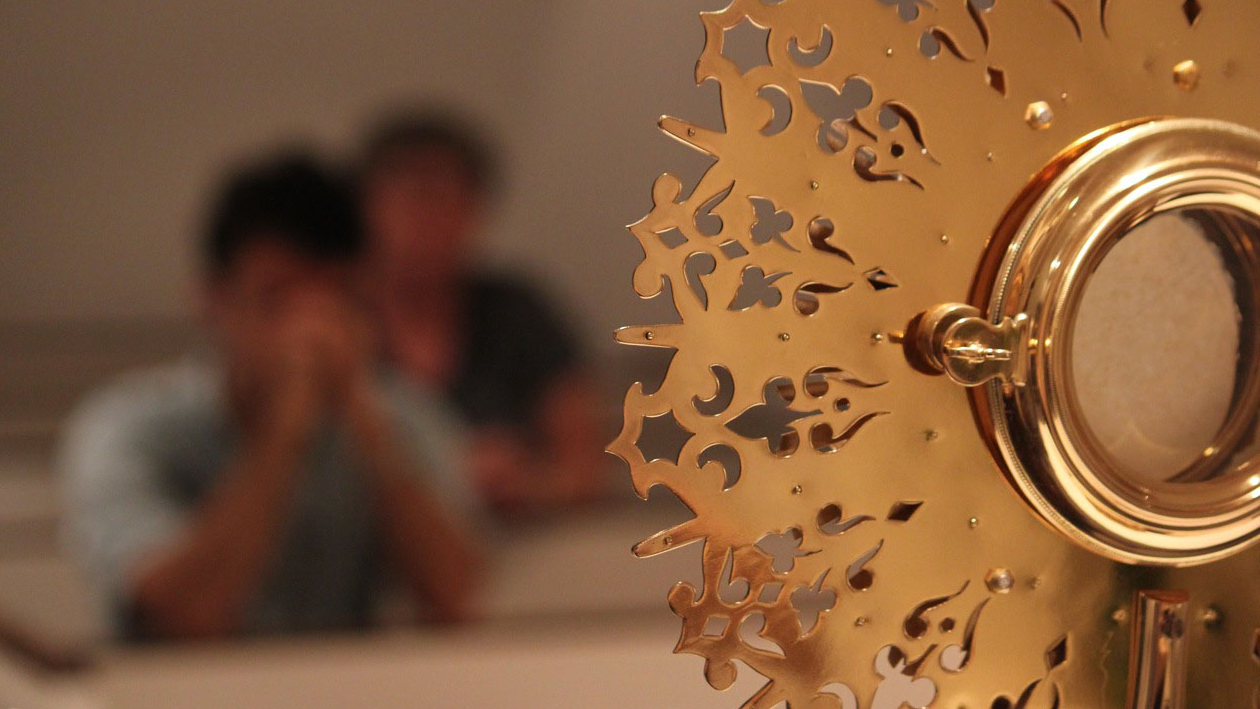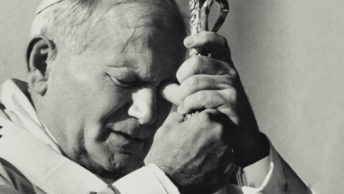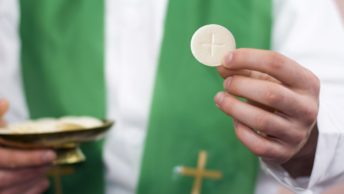The sixth chapter of St. John’s gospel takes us to the core of our Church. Everything and anything Catholic flows from the Real Presence of Jesus Christ here in the Blessed Sacrament. Christ’s Presence among us in the Blessed Sacrament is the summit and source of our lives together in the Church. It is the heart of the matter.
I can remember as a boy participating in Forty Hours Devotions, Eucharistic Adorations, Corpus Christi Processions, Benediction of the Blessed Sacrament, reciting prayers of thanksgiving after Mass, genuflection to the Presence, visits to the Blessed Sacrament, fasting from midnight prior to receiving Holy Communion the next morning, and other practices – all built up from and pointing toward our contact with Jesus Christ truly and really present in the Blessed Sacrament. We were careful always to refer to the consecrated host as the Body of Christ; we never spoke of it simply as “the bread”. We referred to the consecrated wine as the Precious Blood, never “the wine”.
In those days, when Catholic men passed by a Catholic church they tipped their hats (in those days men wore hats) to acknowledge and reverence the Presence of Christ in the tabernacle. Women covered their heads with hats, shawls, babushkas and even hankies while in church. In recent years I’ve seen both boys, and men as well, wearing baseball caps in church, oblivious to the irreverence.
And certainly when I was young everyone — man, woman and child — dressed up to attend Mass. Attending Mass in, T-shirts, tank tops, blue jeans, cutoffs, and what have you was UNTHINKABLE. Church was special, not ordinary. Church was supposed to be extra-ordinary. The inside of a Catholic Church was holy space; it was sacred space. God in His holiness dwelled therein — and people dressed accordingly.
And today? Well . . . whatever happened to reverence? As a matter of fact, what DO we Americans reverence . . . if anything? As a nation of people we no longer kneel to anything. There are even those who advocate that we abolishing kneeling in church and during the Eucharistic Prayers of Mass. But in my view, kneeling during worship is the only thing left for us by which we can express our profound reverence for God’s presence. Kneeling is our last remaining experience of reverence and awe in God’s closeness to us.
I am not here to scold you or to harangue you. I’m here trying to hold up a vision before your eyes. For it does appear to me that in our American culture little is revered . . . except, perhaps, for the pop-star, singer who calls herself Madonna. Even human life itself is no longer revered. If human life gets in the way now, we kill it, either in its beginning, or lately at its end (and a whole lot of the rest of the time during our lifetime!)
I am distressed, to say the least, at what has happened. I’m saddened to see how we lack respect for each other; we’ve lost reverence not only in the way we live but for human life itself, and how we seem to be losing reverence and respect for the Presence of Christ in the Blessed Sacrament.
So whatever happened to sacred space? Remember when the interior of a church was regarded as sacred space? Now it’s regarded as an auditorium in which loud talk and joking around occurs (especially so during wedding rehearsals). Some even treat it as a playpen. Some eat in church, or drink soda pop, read newspapers, or simply sit there bored out of their minds with absolutely no awareness of God’s Presence in this sacred space. I’ve even had people come to receive Holy Communion while chewing gum! (And I’m not talking about kids, either.)
If we dress up to go to a party, why can’t we dress up to attend the Lord’s Supper, the Wedding Feast of the Lamb? Ever see anyone go to a friend’s wedding dressed in cutoffs and a t-shirt? There’s nothing hypocritical in dressing up to go to church . . . any more than there’s anything hypocritical in dressing up to go over to a friend’s house for a special dinner or party. Anybody ever claim THAT is hypocritical?
And as for talking in church- well, there’s certainly a way of talking that reverences other persons. Where better to reverence another, and pay quality attention to what they have to say, than in church, talking with them in that holy space, in front of Christ present in the Blessed Sacrament?
You see, we need to learn to reverence the Presence of the Holy Spirit in other people while at the same time reverencing the Presence of Christ in the Blessed Sacrament. As a matter of fact all social justice and all economic justice flow from the central reality. As Catholic Christians we judge our political, economic and political systems on the truth that each and every human person is sacred unto the Lord; each and every person is a temple of God’s Holy Spirit. The communion of the Mystical Body of Christ flows from the Holy Communion we share in the Eucharist. We need to reverence His presence in a whole lot of different ways, not just in church.
Reverence of God, I think, is multidimensional; it takes many forms. We need to reverence the Son of God, present for us here in the Eucharist. We need to reverence the presence of the Holy Spirit in other people, along with the Presence of God in all of His creation. We’ve lost reverence for the presence of God in our world, in the trees and natural resources, in nature’s pure waters, in animals, in all of God’s creatures. We regard them today merely as useful, as things to exploit for profit. We’ve lost our reverence for them. Perhaps if we recovered a sense of reverence, our world would be a whole lot better place in which to live.
There was a time when the things of nature, water, trees, and natural resources were seen as given to us by God as His stewards, to be used to accomplish His work. Today? Well, water, resources and the environment are only useful for their owners, as things to be sold for profit, as things to be exploited. A sense of reverence perhaps would return balance to the way in which we treat our environment and our natural resources.
The recovery of reverence, it seems to me, ought to be one of our chief goals, particularly in the context of the “culture” that surrounds us.
THAT, I think, is what Corpus Christi is all about.








